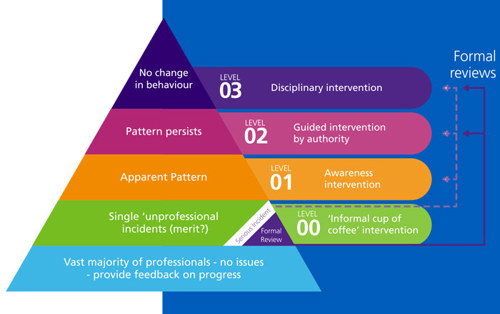Misunderstandings and poor behaviour, which are managed well and resolved fairly, are part of what makes a supportive and positive department.
The aim of addressing poor behaviours is to bring about an understanding and a change behaviour, not to blame and punish. The restorative aim is delivered using support and compassion.
This module is not designed to address formal processes for handling serious and formal allegations but some basic principles can be adapted for use in formal processes.
What level of intervention is appropriate?
Before taking the decision to speak to the perceived perpetrator it is important to establish whether the behaviour is one that can be appropriately dealt with informally or whether it is serious enough to warrant formal reporting. Serious incidents that require formal processes to be followed include (but are not limited to) assault, sexual harassment, stealing, discrimination and harassment which are all illegal actions.
Figure 1: The promoting professionalism pyramid

Adapted from Hickson 2007*
The NHSi Civility and Respect Toolkit includes an in-depth explanation illustrated with scenarios, of how the promoting professionalism pyramid (pages 32 to 50) can be used within the NHS to help address negative behaviours with an ‘informal’ conversation in the first instance and working up to disciplinary actions where the incident is too serious to be dealt with informally or where the behaviour persists despite stepwise intervention.
Do informal interventions work?
YES! Having informal interventions has been found to be effective for the majority of recipients.2 Not only does having such a process cultivate a positive safety culture it also stops situations from escalating to a stage where formal processes need to be followed. It has been found that up to 85% of those involved in formal processes (both the supposed victim and perpetrator) are dissatisfied following the process which can be understandably challenging for all involved(3)).
Why do we need to learn how to address poor behaviours?
Most of us working in healthcare have either experienced, witnessed or had to deal with negative behaviours in the workplace, some of us have experience of all three. These instances have wide-reaching negative consequences as outlined in Module 7 Question 4 "What are the effects of poor workplace behaviour and culture on patient safety, the team and quality of training?"
However, we know that most people do not come to work with the intention of undermining, bullying or being rude, often those that display these behaviours may be under stresses of their own and are unaware that they are behaving in a negative manor or of the impact of their behaviours on those around them.
Most of us have had little or no training in calling out these behaviours. Although, on the face of it, it is a simple conversation, it does require some degree of thought, planning and ideally training. The conversation needs to be addressed in a calm, kind, and compassionate manor and remain free of accusation and judgement.
This module will provide you with the foundations for having these difficult conversations using the second messenger system, as the person who has experienced the negative behaviour or as the bystander.
Reference
1) Hickson, Gerald B. MD; Pichert, James W. PhD; Webb, Lynn E. PhD; Gabbe, Steven G. MD A Complementary Approach to Promoting Professionalism: Identifying, Measuring, and Addressing Unprofessional Behaviors, Academic Medicine: November 2007 - Volume 82 - Issue 11 - p 1040-1048 doi: 10.1097/ACM.0b013e31815761ee
2) In Conversation with Gerry Hickson, Patient Safety network, 2009
